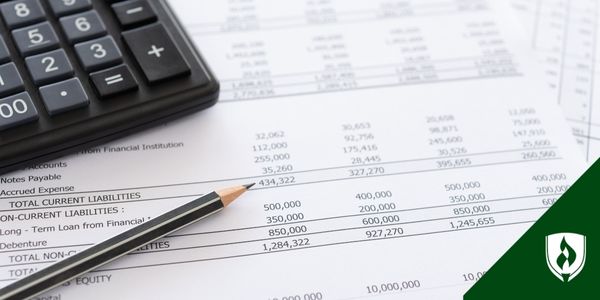What Can You Do With an Associate’s Degree in Accounting? 5 Paths to Consider
By Noelle Hartt on 08/29/2024

If you’re comfortable working with numbers, you’ve probably kicked around the idea of pursuing an accounting career at least once or twice.
Maybe you’re even gearing up to enroll in an accounting program at this very moment. But, if it’s still early in your educational research journey, then you might have questions about whether an Associate degree in Accounting is right for you.
So, if you’re curious about how an accounting education may prepare you for future career opportunities, keep reading!
Associate accounting degree vs. Bachelor's accounting degree
The first thing to understand about accounting programs is that an associate program tends to be shorter and more targeted on practical skills. A bachelor's degree goes more in-depth and tends to also take longer.
For some, getting an associate's degree in accounting is their plan to get going in the industry. But it's important to note that the traditional role of "accountant" typically requires the full bachelor's degree.
Please note that Rasmussen University's Accounting Associate's degree program is not designed to prepare graduates for any state-issued professional license or certification. This program does not meet all educational prerequisites for licensure as a Certified Public Accountant (CPA) in any state.7
4 Careers to consider with an Associate's degree in accounting
Businesses of all sizes rely on people with basic accounting skills to perform a myriad of tasks. And, according to the Bureau of Labor Statistics, entry-level positions for the following job titles “typically need some postsecondary education,” though a Bachelor’s degree is not required.1,2
1. Bookkeeper
Sometimes referred to as, “bookkeeping clerks,” bookkeepers play a major role in the way companies manage finances. In business, the term, books, refers to a company’s accounting records, which should include any transactions into and out of the company, supporting documentation like checks and invoices, and more.
A bookkeeper helps maintain accurate, up-to-date accounting records by logging and classifying transactions and reconciling accounts. Bookkeeping serves several purposes: first, it allows an organization’s leadership—as well as its finance and accounting departments—to analyze and track the company’s overall financial health.
At the same time, bookkeeping is a necessary step for developing the financial reports organizations need to prepare and file corporate tax returns.
Additionally, organizations must share their accounting records with lenders when they apply for business loans. Among other documents and information, lenders typically request to see balance sheets, profit and loss statements and cash flow statements—all of which bookkeepers help to prepare.
Bookkeepers are also instrumental in preparing other business documents. For example, the U.S. Securities and Exchange Commission (SEC) requires every publicly traded company to publish a report called a “10-K” each year.
A 10-K report provides an organization’s investors with a comprehensive overview of the company’s business operations and finances. This report must include an income statement, balance sheet and cash flow statement—all of which bookkeepers help put together.
A bookkeeper may work as an in-house employee within an organization; alternatively, bookkeepers may work for firms that provide clients with bookkeeping and/or accounting services.
“Bookkeepers who work for multiple firms may visit their clients’ places of business,” states the BLS, adding that bookkeepers tend to work alone, but may “collaborate with accountants, managers, and auditing clerks from other departments.”4
2. Accounting clerk
Not to be confused with an accountant, an accounting clerk typically handles specialized tasks to help an organization keep track of its financial transactions. Professionals who work in accounting clerk roles may even have job titles specific to the types of work they do. For example, the BLS explains an accounting clerk may be called an “accounts payable clerk” or an “accounts receivable clerk,” if applicable.4
Accounting clerks generally work for large organizations, which makes perfect sense: These professionals carry out tasks an accountant could perform, but it is not necessary to complete a Bachelor’s degree in Accounting—nor is taking the CPA exam required—to do the work of an accounting clerk.
Nonetheless, there are opportunities for accounting clerks to progress past entry-level roles throughout their careers. As the BLS shares, accounting clerks’ responsibilities “frequently vary by level of experience.”
Entry-level accounts receivable clerks will interact with customers a fair bit. They may need to answer the phone, respond to questions clients have about their accounts, and assist with transactions. Accounting clerks who are new to the field might also be responsible for ensuring companies’ loans and accounts are paid in a timely manner.
Conversely, accounting clerks who have more knowledge and experience may complete more advanced tasks like balancing billing vouchers or internally auditing the company records.
3. Auditing clerk
Despite having similar-sounding job titles, auditing clerks are not auditors. An auditing clerk’s job is to catch any mathematical and/or coding errors in an organization’s figures, postings and documents, notes the BLS.3
In addition to reviewing financial records for accuracy, auditing clerks may also help companies act in compliance with regulations. Naturally, these professionals are among the first to notice errors in companies’ financial data. So, you’re probably wondering: How are those errors corrected?
Ultimately, the BLS suggests that depends on the size and scope of each identified error. When auditing clerks spot minor mistakes, like transcription errors, they usually have the authority to correct those mistakes themselves. But, when it comes to “major discrepancies, they typically notify senior staff, including accountants and auditors," according to the BLS.
4. Start your own business
Do you ever think about starting your own business? Whether you want to sell goods or services, earning an accounting degree could be a smart way to prepare for an entrepreneurial endeavor.
Accounting majors develop skills in not only basic accounting principles, but also reading and interpreting important financial statements.
Furthermore, Associate degree-holders will understand managerial accounting concepts, which are especially relevant to owners of small businesses. As a founder and shareholder, you will need to routinely review managerial accounting information, such as product costs, budgets and forecasts.
Managerial accounting information is like a compass; it helps guide decision-making and offers valuable insight into the financial sustainability of business operations.
As you can imagine, though, there is a learning curve when it comes to navigating financial data. The language alone takes some getting used to.
For example, unless you have previous work experience in the accounting field, concepts like accounts payable and accounts receivable—and how each influences day-to-day operations—might be completely foreign to you.
But, regardless of which industry you see yourself launching a company in, you will ultimately need to comprehend basic accounting concepts if you choose to start a business.
5. Or, you could continue your education
Anybody interested in becoming an accountant will typically need to complete a Bachelor’s degree program.5
Depending on your specific career goals, however, a Bachelor’s degree in accounting may not be the only credential you’ll need to obtain.
There are various accounting certifications you may wish to look into if you’re interested in working as an accountant. Perhaps the most well-known credential is that of a certified public accountant, also known as a “CPA.”7
CPA licensure, the BLS points out, is required for an accountant to file reports with the SEC.9 It’s also important to note that CPA licensure is required to work as a public accountant, whereas a private accountant does not need to take the CPA exam.
At this point, you’re probably wondering: What’s the difference between public versus private accountants?
One of the main distinguishing factors is where each type of accountant works. Public accountants often work for accounting firms; they provide services to a range of clients. Private accountants, on the other hand, work as in-house employees of the organizations they provide bookkeeping, payroll and/or other tax-related services for.
There’s one other factor you should keep in mind, as well. Public accountants typically work for multiple clients, which sometimes requires traveling for meetings.
Not sure if either career path sounds like the right fit for you? Before you completely write off the idea of becoming an accountant, there’s one other way a Bachelor’s degree in Accounting can open doors for you: Have you ever heard of a government accountant?
“Government accountants maintain and examine the records of government agencies and audit private businesses and individuals whose activities are subject to government regulations or taxation,” says the BLS.5
A government accountant may work for the federal, state or local government. If you’re good with numbers and interested in a future in the private sector, becoming a government accountant could certainly be worth giving some thought to!
A position as a government accountant may require additional education beyond a bachelor’s degree in accounting, certification and related work experience. It is important to check with employers regarding requirements.
Kick off your journey with an Associate degree in Accounting from Rasmussen
You’ve got a strong sense, now, of the types of careers and educational opportunities that await a degree-holder with an Associate’s in Accounting. From entry-level jobs to additional education, there are so many different directions an accounting career can take you in—and they can all be immensely fulfilling.
If you’re ready to acquire new knowledge and develop skills that have real-world applications, consider pursuing your Associate’s degree in Accounting online at Rasmussen.
Students in our Accounting program receive a well-rounded education as they study topics that include everything from business law to payroll accounting, income tax, business ethics and more. Accounting majors also gain experience using industry-relevant software programs, including QuickBooks® and Excel®.
Our Associate’s degree program can even be finished in as few as 18 months.6 Learn more about how you can advance your education at Rasmussen University today!
QuickBooks® is a registered trademark of INTUIT INC.
Excel® is a registered trademark of Microsoft Corporation
1Bureau of Labor Statistics, U.S. Department of Labor, Occupational Outlook Handbook, Bookkeeping, Accounting, and Auditing Clerks, (accessed June 12, 2024), https://www.bls.gov/ooh/office-and-administrative-support/bookkeeping-accounting-and-auditing-clerks.htm#tab-2
2Bureau of Labor Statistics, U.S. Department of Labor, Occupational Outlook Handbook, Bookkeeping, Accounting, and Auditing Clerks, (accessed June 12, 2024), https://www.bls.gov/ooh/office-and-administrative-support/bookkeeping-accounting-and-auditing-clerks.htm#tab-4
3Bureau of Labor Statistics, U.S. Department of Labor, Occupational Outlook Handbook, Bookkeeping, Accounting, and Auditing Clerks, (accessed June 13, 2024), https://www.bls.gov/ooh/office-and-administrative-support/bookkeeping-accounting-and-auditing-clerks.htm#tab-3
4Bureau of Labor Statistics, U.S. Department of Labor, Occupational Outlook Handbook, Bookkeeping, Accounting, and Auditing Clerks, (accessed June 25, 2024), https://www.bls.gov/ooh/office-and-administrative-support/bookkeeping-accounting-and-auditing-clerks.htm#tab-2
5Bureau of Labor Statistics, U.S. Department of Labor, Occupational Outlook Handbook, Accountants and Auditors, (accessed June 27, 2024), https://www.bls.gov/ooh/business-and-financial/accountants-and-auditors.htm#tab-2
6Completion time is dependent on transfer credits accepted and the number of courses completed each term.
7Rasmussen University’s Accounting Bachelor’s degree program is not designed to prepare graduates for any state-issued professional license or certification. Rasmussen University’s Accounting Bachelor’s degree program does not meet all educational prerequisites for licensure as a Certified Public Accountant (CPA) in any state. Each state determines its own requirements for licensure as a Certified Public Accountant (CPA). Please consult with your state’s board of accountancy or equivalent oversight agency for further details. This program as not been approved by any state board of accountancy or other professional licensing agency.




